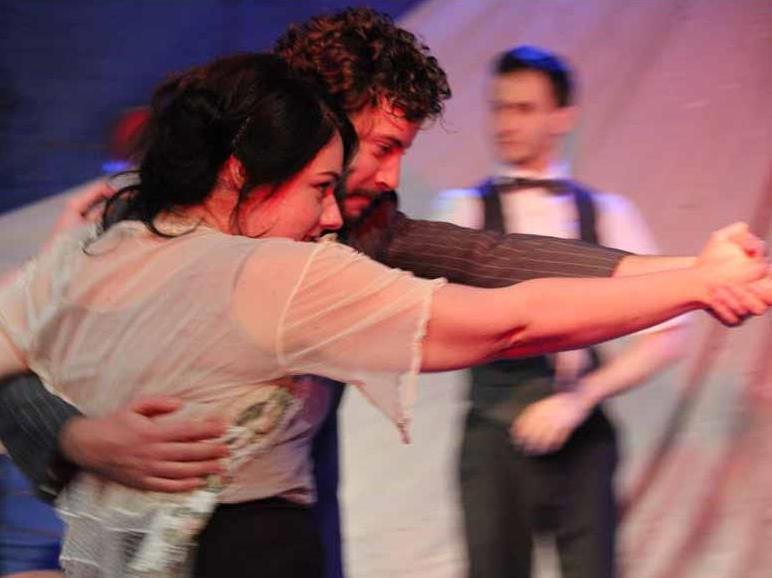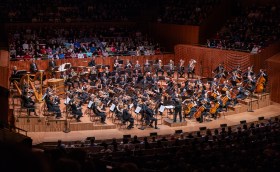Amy Scott-Smith, Richard Hilliar and Jasper Garner Gore in The Ishmael Club.
Artist Norman Lindsay is the role Attorney-General George Brandis was born to play. Like the author of The Magic Pudding, Brandis is an active member of a men-only Melbourne club. Lindsay thought women were ‘half-minds’, while Australia’s chief legal officer thinks Julia Gillard is a ‘one-dimensional person’ for not having children. Lindsay fervently believed art was for ‘higher minds’ rather than the ‘savages’ of the working class, and Brandis has turned this belief into national policy. These two men are separated by generations, but as class, culture and gender warriors, they are cut from the same expensive cloth.
Bill Garner and Sue Gore’s The Ishmael Club chronicles the lives of friends, bohemian artists and political satirists Norman Lindsay, Will Dyson and Ruby Lind in the early 1900s. Seen through the eyes of Mrs Maggia, owner of Fasoli’s Cafe on Lonsdale Street where the group met each week, the play follows the three protagonists from their boisterous meetings in Melbourne to their time in the UK and back again. Relations sour among the trio when Dyson marries Lindsay’s sister Ruby and the lovers succeed professionally in London where the more prominent artist fails. These personal dramas are set against a fascinating period of UK political history. Dyson and Lind play important roles within the rising socialist and suffragette movements prior to World War One, only to see these forces decimated by wartime British nationalism.
It’s not the First World War that takes centre stage in this play, but the recently resurrected ideological war about the role of the arts in modern society. On one side there are elitist individuals like Lindsay and Brandis who want to protect the arts from the corrupting influence of the masses and preserve it for the select few. On the other side there are people like Will Dyson, Ruby Lind and thousands of artists around Australia today who believe the arts should be open to all. At a crucial and precarious time in the history of arts funding in this country, The Ishmael Club has the courage to undercut elitism and move the audience with a vision of the arts as a democratic force which can agitate for social justice.
This current production at The Old Fitz Theatre features solid performances. Jasper Garner Gore is wonderfully loathsome as Norman Lindsay. Garner Gore alludes to the profound insecurity behind his character’s recurrent misogyny and boastful arrogance. Small gestures like wiping off his jacket when brushed by Dyson are a nice touch, and his bitter envy and cold, Snape-like reactions to tragedy stoke the audience’s ire. Richard Hilliar as Will Dyson is a marvellous foil to Garner Gore’s Lindsay. Hilliar captures every bit of Dyson’s passion, energy and likeability. He transitions smoothly through uproarious young drunk, struggling artist, supportive husband, political activist, orator and broken war veteran, mostly within about 20 minutes. His speech to 10,000 people on how strike action can generate respect for workers is especially stirring. The production blog says Amy Scott-Smith can ‘pick apart a character to find its heart, no matter how thinly drawn or deeply buried’. Her portrayal of Ruby as strong-willed, intelligent and independent-minded offers no evidence to the contrary.
Despite strong performances and engaging themes, the pacing of The Ishmael Club does seem a little off. The play runs for just over an hour, and much of the first half is spent on the drunken buffoonery of the club. The back end of the story is crammed with interesting plot developments and various political struggles, giving it an uneven feel.
It’s also fair to say that the show’s production values are austere. This is not so much a criticism of the work as a symptom of the limited resources for small organisations in the arts sector. With only two weeks of rehearsals, two days each for the costumes, set and props, no money to pay anyone and performing in the late night slot at the Old Fitz on the set of Brendan Cowell’s Men, it’s an apt example of the impacts of neoliberal austerity at a grassroots level. Given these constraints, it’s amazing that this production succeeds at all. Its very existence is one small totem of resistance against the current government’s slash and burn approach to the arts industry.
In The Ishmael Club, the spirits of Will Dyson and Ruby Lind, and their view of the arts as an inclusive force for good, live on.
Rating: 3.5 out of 5 stars
The Ishmael Club
Written by Bill Garner and Sue Gore
Director: Suzanne Millar
Cast: Katrina Rautenberg, Jasper Garner Gore, Richard Hilliar, Amy Scott-Smith
Design: Suzanne Millar and John Harrison
Costume Design: Sonia McAlpine
The Old Fitz Theatre, Woolloomooloo
7 July – 18 July 2015





